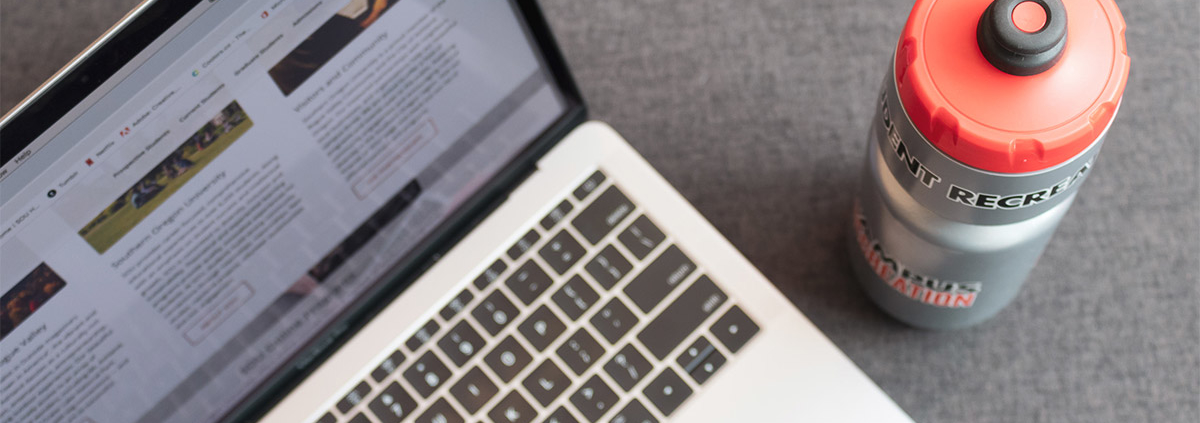Wellness and Self-Care During Finals
It’s that time of year again: finals. The end of the term can be super stressful for students and the words “self-care” tend to get thrown around a lot. But what is self-care? While it might be associated with long baths, face masks, and staying in bed for Netflix marathons (all of which can be hard to justify with looming deadlines), self-care just means taking time to make sure that your overall wellness isn’t being sacrificed to cram for tests and write essays. Read on for some tips for staying well during the busiest time of the year.
Keep Drinking Water
While it might be tempting to drink nothing but coffee and energy drinks during quiet week and finals, not getting enough actual water can be detrimental to your focus and productivity. Your brain needs water to keep cognitive performance high; without it, you can start to feel cranky, tired, and foggy. If you don’t already have one, invest in a reusable water bottle (you can find one at the bookstore, the Landing, or pretty much any grocery store in Ashland), and carry it with you in your bag. If you don’t think you can completely stop your caffeine intake, make sure to at least drink some water before and after each round of caffeine.
Work Intentionally
The amount of work and studying that happens during the end of the term is overwhelming for a lot of students. Tackling big projects can be daunting, especially if you feel like you need to complete them all at once. However, figuring out ways to break the work down into smaller, more manageable tasks can help. Instead of putting “write paper” in your planner, try breaking it down into “write intro,” write argument 1,” write conclusion,” etc. Focusing on smaller pieces at a time can keep you from getting overwhelmed and panicked. Also, if you’re having trouble concentrating (i.e. picking up your phone and scrolling through Instagram every 30 seconds), try setting a timer. Commit to working for 15, 20, 25 minutes at a time, then take a five-minute break. Every couple of hours, take a longer break to grab food, exercise or relax. You can download an interval timer to your phone, or use a website like TomatoTimer to help stay on schedule.
Get Your Heart Rate Up
Exercise can be a great way to increase your energy, and clear your mind during stressful times like finals. Spending some time on a treadmill, playing some pickup basketball with your buddies, or crushing a challenging climbing route is the perfect way to take a break and re-direct your focus to something other than homework. Plus, the end of the term is the perfect time to visit the Student Recreation Center since it tends to be much less busy during the last two weeks of classes. Don’t have time for a long workout? Try walking across campus instead of re-parking your car, or doing some simple yoga in your dorm room.
Get Organized
It’s hard to be productive when your space feels messy. Take five minutes before sitting down at your desk or in your bed to tidy up – clear away dirty plates and cups, throw away any trash, and make sure you have all your materials within arm’s reach. In addition to your physical space, try to organize your mental space as well. Write down deadlines in a planner, use your Google calendar or your phone to set reminders for tests, and make a checklist of everything you need to get done. Knowing what your schedule is and how your deadlines fit together will help you plan and avoid forgetting important things during a busy week.
Laugh
Each time you laugh, endorphins (the chemicals that make you feel good) flood into your brain, and your levels of stress hormones drop. This makes laughter an excellent way to help manage stress and boost your mood during busy times. Laughter is easy to incorporate into a study routine – watch a funny YouTube video during your study breaks, find a relatable meme to send in your group chat, or schedule time to hang out with your friends or roommates.
Make Time for Mindfulness
Like “self-care,” mindfulness is a concept that might be familiar, but not completely understood to some people. Practicing mindfulness is simple – it’s checking in with yourself, and being aware of your thoughts and feelings. Intentionally practicing mindfulness through meditation, breathing routines, and exercise like yoga can reduce anxiety and help calm and re-focus your mind. Try downloading a mindfulness app like Calm or Headspace to learn techniques and practice guided meditations, or search “breathing exercise” to find a quick visual guide to focus your breath. Plus, if you need a quiet, relaxing space on campus to check in with yourself, try visiting the Oasis in the Student Recreation Center.
Remember, self-care looks different for everyone. Not everything on this list might work for you, and that’s ok! The most important thing is to figure out the best way for YOU to manage your stress and to make time for yourself to work on your wellness, especially when you feel overwhelmed. Now get out there and crush those finals!



